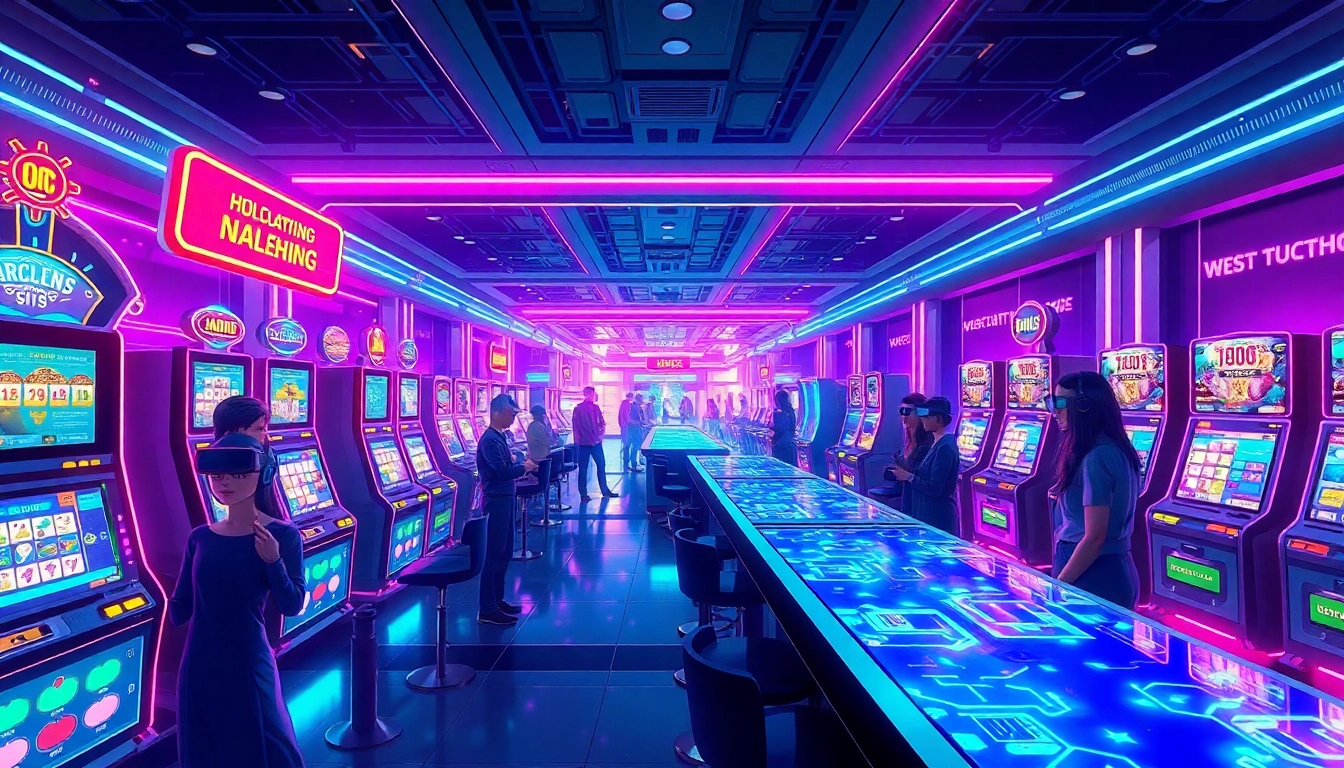Understanding New Technology in Gambling
What is New Technology?
New technology refers to the latest advancements and innovations that enhance various aspects of efficiency and operational success in different industries. In the context of gambling, new technology incorporates innovations including mobile gaming, blockchain, artificial intelligence (AI), and virtual reality (VR). These technologies are fundamentally reshaping how players engage with gambling platforms, focusing on creating immersive experiences that prioritize security, ease of use, and interactivity. For anyone tracking the gambling landscape, following the latest New Technology trends is essential to understanding its evolution.
The Importance of Innovation in the Casino Industry
Innovation is a cornerstone of the casino industry, driving the development of user interfaces and enhancing user engagement. As competition increases, casinos must adopt new technologies to differentiate themselves. For instance, the introduction of AI can offer personalized gaming experiences tailored to individual player preferences, while data analytics can streamline operations and optimize marketing strategies. Implementing such innovations creates a competitive edge, allowing casinos to attract and retain customers in an ever-evolving market.
How New Technology Enhances User Experience
User experience (UX) is paramount in the gambling industry, influencing customer satisfaction and loyalty. New technologies facilitate more engaging and interactive experiences. Gamification strategies, incorporating elements such as rewards and social interaction, enhance the traditional gambling experience. Furthermore, virtual and augmented reality technologies create immersive gaming environments that can simulate real-world casino experiences, thus bridging the gap between physical and digital gambling. These enhancements lead to increased customer enjoyment and, ultimately, higher revenue for casinos.
Emerging Trends in Gambling Technology
Virtual and Augmented Reality in Casinos
Virtual reality (VR) and augmented reality (AR) technologies are on the rise, providing players with immersive gaming experiences. VR casinos allow players to enter a virtual space where they can interact with a 3D environment and other players, simulating the experience of being in a real casino. For example, platforms like VR Casino and SlotsMillion have developed extensive offerings that incorporate these technologies, providing gamers with seamless and realistic gameplay.
On the other hand, augmented reality enhances the physical casino experience by providing additional layers of digital information to players. This could be as simple as using AR to display game rules or complex as integrating interactive features that transform the gaming tables into animated experiences, heightening engagement and participation.
Blockchain and Cryptocurrency Adoption
Blockchain technology is revolutionizing the gambling industry by offering transparency and security, providing players with trust and integrity in their transactions. Notably, many modern casinos are starting to accept cryptocurrencies, creating a new layer of anonymity and security for players. Cryptocurrencies eliminate the need for traditional banking methods, which often have lengthy processing times. This enables instant deposits and withdrawals, which are essential for players requiring immediacy in their gambling activities.
Furthermore, the immutable nature of blockchain transactions ensures that all bets and payouts are securely recorded, minimizing fraud, improving accountability, and providing an auditable trail for regulatory compliance. This not only enhances player confidence but also protects operators against potential legal issues.
Artificial Intelligence’s Role in Gaming
Artificial intelligence (AI) is becoming integral to the gambling experience by providing enhanced customer service, customized player experiences, and fraud detection. AI algorithms analyze user data, allowing casinos to craft personalized promotions, suggest games based on individual preferences, and improve customer interactions through chatbots.
Additionally, AI is instrumental in responsible gaming initiatives. By analyzing spending patterns and player behavior, AI can help identify at-risk players and provide interventions, thereby ensuring a safer gambling environment. This proactive approach not only contributes to player welfare but also enhances the casino’s reputation and compliance with regulations.
Challenges of Implementing New Technology
Regulatory Hurdles in Gambling Technology
The gambling industry is tightly regulated, with stringent laws governing operations, which can complicate the implementation of new technologies. Each jurisdiction has its own set of rules, typically centered around consumer protection and responsible gaming. As technology evolves, regulators must keep pace to ensure that legal frameworks continue to adequately protect players and ensure fair gaming.
Dozens of legal challenges can arise when introducing technologies like blockchain and cryptocurrency, as many regulatory bodies are still working to understand their implications. Casinos must navigate these environments carefully, ensuring that any technological advancements comply with existing laws and seeking legal counsel when necessary.
Infrastructure Costs and Tech Integration
Integrating new technologies into existing casino infrastructures can involve significant costs, particularly for legacy systems that may not easily interface with modern solutions. Upgrading hardware, retraining staff, and adjusting back-end systems to ensure seamless operations can require substantial investment.
Moreover, casinos must ensure that their technological environments remain scalable. Investing in flexible systems that can adapt to technological advancements is essential for maintaining competitiveness without incurring excessive future costs.
User Adoption and Learning Curves
Even the most advanced technology is ineffective if users are unwilling to adopt it. Some players may be resistant to new technologies due to preferences for traditional gaming experiences or concerns regarding the security of mobile platforms. To facilitate adoption, casinos should invest in comprehensive training programs that educate players about the benefits of new technology, ensuring they feel safe and informed.
Best Practices for Leveraging New Technology
Steps for Integrating Technology Seamlessly
Successful integration of new technology starts with thorough planning and understanding of business objectives. Casinos should identify specific pain points they wish to address, whether it is enhancing user experience or streamlining payment processing. Developing a technology roadmap that outlines steps for integration, including timelines, responsibilities, and budget requirements, is crucial.
Involving stakeholders – including employees and customers – in testing new systems can yield valuable insights and foster a sense of ownership, ultimately leading to smoother implementation and higher satisfaction rates.
Engaging Players with Personalized Experiences
Personalization is key in modern gambling experiences. Casinos can leverage data analytics and AI to create tailored gaming experiences that resonate with individual players. For instance, offering personalized bonuses or suggesting games based on previous play can enhance engagement. Data-driven insights allow casinos to refine marketing strategies, ensuring they effectively respond to player preferences and behaviors.
Utilizing Data Analytics for Continuous Improvement
Data analytics plays a pivotal role in assessing the effectiveness of new technologies. By continuously monitoring player engagement, behavior, and feedback, casinos can make informed decisions about technological investments and adaptations. Regularly analyzing this data not only provides insights into customer preferences but also highlights operational efficiencies and areas for enhancement, ensuring that casinos remain competitive and appealing to their customers.
Future Predictions for Gambling Technology by 2025
Impact of New Technology on Traditional Gambling
The next few years will see a significant transformation in traditional gambling models due to new technologies. As players increasingly gravitate toward online and mobile gambling platforms, brick-and-mortar casinos will need to adapt by integrating technologies that enhance in-person experiences. This might include interactive displays, AI-driven customer service, or even virtual environments within physical casinos.
Trends to Watch in the Next Five Years
Five years from now, we can expect to see further integrations of AI and machine learning across gambling platforms. Enhanced VR experiences will likely proliferate, making remote gambling feel increasingly immersive. Additionally, cryptocurrency will likely become the standard for transactions within the industry, with many players favoring its speed and anonymity.
Success Metrics for Technology-driven Casino Models
Successful technology implementation should center around a few key performance indicators (KPIs). These may include player acquisition rates, retention statistics, transaction speeds, and customer satisfaction scores. Regularly evaluating these metrics will help casinos refine their technological strategies and ensure they meet evolving player expectations.


